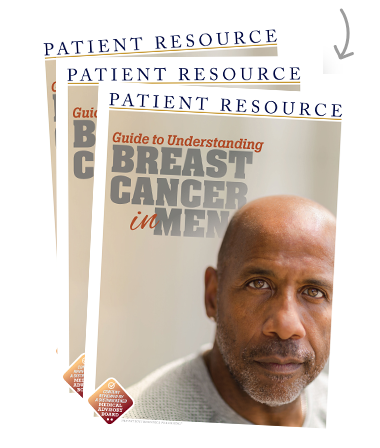Male Breast Cancer
Supportive Care
When you learned about your diagnosis, your shock may have been compounded by embarrassment at having what is traditionally known as a “woman’s disease.” Realize that your feelings are valid. Discussing them and comparing notes with other men who have breast cancer can be immensely helpful.
Addressing Side Effects
Preventing, minimizing and managing the side effects of the cancer or its treatment is a primary focus of your multidisciplinary health care team. As you and your doctor review your treatment options, discuss the potential physical and emotional side effects of each type of therapy. Ask about any that need immediate attention and find out what to do if they occur. Prompt or preventive treatment may help avoid more serious complications. To be most effective, your health care team will rely on you to communicate openly about how you feel and any side effects you are experiencing (see Table 1).
Additional Resources to Explore
Supportive care is designed to ensure your whole person is cared for.
- Fertility can be affected by treatment or the cancer itself. Treatments may cause infertility by damaging sperm quality, lowering sperm production, altering hormone levels or causing impotence. The most common option for preserving a man’s fertility prior to cancer treatment is called sperm-banking, or sperm cryopreservation (freezing and storage). For men who do not choose to bank sperm prior to treatment, doctors usually recommend waiting 2 to 5 years to try to have a child. Talk to your doctor about fertility implications related to your specific cancer treatments before beginning treatment, if possible.
- Dietary support may be needed if you have challenges with nausea or your appetite. If a dietitian or nutritionist is not on your health care team, ask for a referral.
- Sexual health is an important part of life, and it should not be ignored because of a cancer diagnosis. Talk with your doctor about ways to maintain your sexuality, or ask for a referral to a therapist who has experience working with people who have cancer.
- Spiritual or religious guidance may be available from a chaplain or spiritual care advisor at the hospital or in your religious community. Spiritual support is available to you even if you do not consider yourself a religious person.
- Transportation support is available for help getting to and from cancer-related appointments.
| Side Effect | Symptoms |
| Anemia | Low energy, weakness, dizziness, light-headedness, shortness of breath, rapid heartbeat |
| Blood clots | Leg discomfort |
| Bone loss and pain | Weakened bone caused by the cancer or treatment |
| Chemo brain | Brain fog, confusion and/or memory problems |
| Constipation | Difficulty passing stools or less frequent bowel movements compared to your usual bowel habits |
| Decreased appetite | Eating less than usual, feeling full after minimal eating, not feeling hungry |
| Diarrhea | Frequent loose or watery bowel movements |
| Fatigue | Tiredness that is increased and harder to relieve than the fatigue an otherwise healthy person has |
| Fever | Raised body temperature that could signal an infection |
| Hair loss (alopecia) | Hair loss on the head, face and body |
| Headache | Pain or discomfort in the head |
| Lymphedema | Swelling where lymph nodes have been removed or damaged |
| Nausea and vomiting | The feeling of needing to throw up and/or throwing up |
| Neuropathy | Numbness, pain, burning sensations, and tingling, usually in the hands or feet at first |
| Neutropenia | Low white blood cell count that increases the risk of infection |
| Pain | Musculoskeletal pain and aches that occur in the muscles, bones, tendons, ligaments or nerves |
| Respiratory problems | Shortness of breath (dyspnea) with or without cough, upper respiratory infections. |
| Skin reactions | Rash, redness and irritation or dry, flaky or peeling skin that may itch |
| Thrombocytopenia | Low number of platelets in the blood, which can lead to bruising and bleeding |
| Weight changes | Gaining or losing weight unintentionally |



